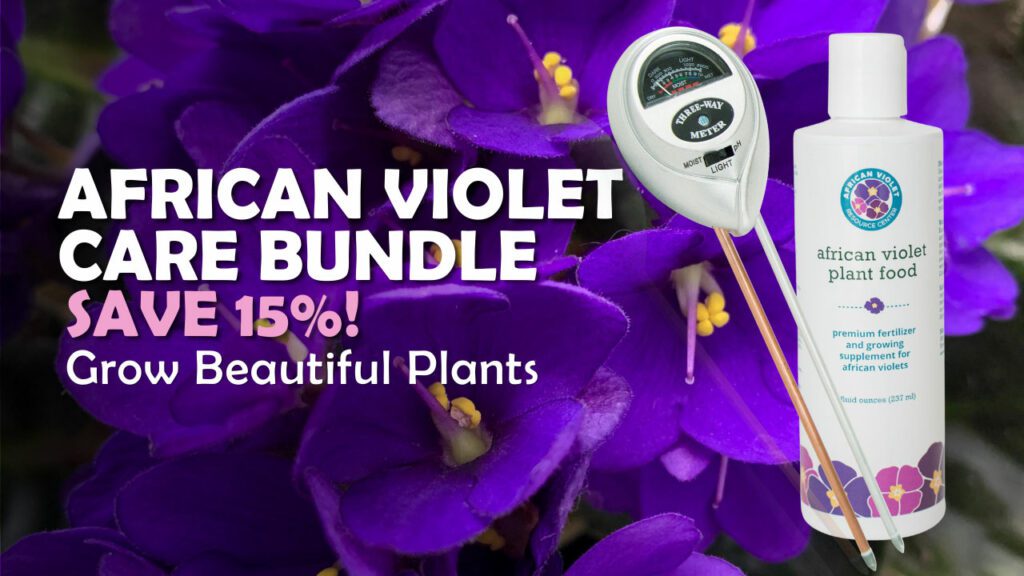African Violet Potting Soil pH Guide
There’s a reason African violets are such a popular houseplant. These flowering beauties are relatively hardy and easy to care for. As long as you set your African violets up for success, you’ll be able to enjoy them with relatively little effort. Using the correct potting soil for African violets is one of the most important factors in keeping these beloved houseplants happy.
Unlike outdoor plants, houseplants only have access to a small amount of soil, so it’s crucial for the soil to be correct. Regular potting mix is not ideal for African violets. Although these plants are not picky about most household environmental conditions, they are a little picky about their soil.
Let’s talk about the best ways to keep your African violets happy and thriving in the perfect soil.
Best pH for African violet soil
You might have heard that you shouldn’t use a regular potting soil mix with your African violets. This is true for several reasons, including because African violets are acid-loving plants. African violets do best in soil with a pH level of between 5.8 and 6.2. Soil is considered neutral if it has a pH of 7, and most regular potting mixes have a neutral pH.
You’ll notice that most soils designed for African violets contain some peat moss because peat moss is highly acidic.
African violets can tolerate soil that is somewhat outside of the range of 5.8 to 6.2, but for best results, try to keep the pH near those levels. If the level gets too far out of that range, your African violets may have a difficult time absorbing the nutrients they need from the soil. The signs of a lack of nutrients can be hard to distinguish from other problems. If you’ve ruled out all other common problems, like lack of sunlight or water, and you are fertilizing your plants regularly but they still seem to have issues that won’t go away, pH imbalance could be the issue.
How to help my African violet recover from a pH imbalance
If you think that an incorrect pH level is causing your African violet to suffer, then you can fix the problem by repotting your African violet.
First, check the pH levels of your African violet soil. Place a 3-in-1 moisture meter halfway down into the soil to check the pH level. If the pH level is extremely outside the 5.8 to 6.2 range, it is best to repot.
Take your African violet out of its pot, and carefully shake it to remove as much soil from the roots as possible without damaging the plant. Place the plant into new potting soil that has a pH of between 5.8 and 6.2
Then water the plant from the top until water drains out of the bottom of the pot. Continue watering until a cup of water drains from the bottom. This helps get rid of anything that might be lingering in the bits of old soil still attached to the roots.
Wait one week after repotting and watering to observe the plant. Do not add fertilizer during this week (there should be enough nutrients in the fresh soil for the plant for at least the first week).
Ideally, you’ll see your plant begin to recover after about a week. If this is the case, then pH imbalance was probably the issue. You can begin fertilizing after this time.
If the same problem reoccurs within a few weeks to a few months after the plant has appeared to recover, your water may be the problem. Repot again, and consider switching to bottled spring water (non-distilled) or rainwater.

Prevent a pH imbalance in my African violet soil
Because it can be difficult to diagnose the symptoms of a pH imbalance compared with symptoms of other problems that African violets can have, it is best to avoid a pH imbalance in the first place.
So, how do you do that? Here are a few things to keep in mind when it comes to African violet soil pH.
- Use potting soil with a pH of between 5.8 and 6.2 when you first pot your African violets.
- Use a balanced fertilizer or one that is specifically designed for African violets. Other fertilizers may cause a buildup in the soil.
- Repot your African violets with fresh soil twice a year. This helps keep the pH more consistent.
- If you normally bottom water your African violets, be sure to top water them at least once every 3 months to wash out fertilizer salts that might have built up over time.
- If you frequently have problems with the soil pH level for your African violets, consider getting an inexpensive soil testing kit so that you can quickly diagnose the problem each time it occurs.
Although this list might make it seem like soil pH imbalance is a frequent problem with African violets, it actually is unusual for this problem to occur all that often. If it’s a problem that you’ve had before, then you’ll want to make sure that it doesn’t happen again. However, some people manage to skip doing any of these preventative measures and still don’t have any issues with pH imbalance.
I only have anecdotal evidence to back this up, but it seems like pH balance is mostly an issue for people who either don’t plant their African violets in the correct soil in the first place or for people who have soft water or other water issues.
Do African violets need special soil?
African violets are relatively hardy and low-maintenance houseplants, but they do need special soil. Regular houseplant potting soil just does not work for them. You’ll only be disappointed if you try to plant your African violets in the same soil you pot the rest of your houseplants in.
African violets need special soil for two reasons. First, as we’ve already discussed, African violets need slightly acidic soil in order to thrive, and most houseplant potting soil has a neutral pH. Second, African violets need soil that drains quickly. Most regular potting soil is just too heavy and holds on to too much moisture. There’s too much risk of root rot if you plant your African violet in regular soil.
African violets are easy to care for and provide months of blooms. It’s worth going through a small amount of extra trouble to get them the soil that they need. Then all you have to do is stick your African violet in a window, water it, and occasionally fertilize it. If the soil is right, you should have few problems with your African violets.
You can either buy a commercial African violet potting mix or follow instructions to make your own mix. Just don’t try to pot African violets in regular houseplant potting soil.
Should I repot my African violet?
As mentioned earlier, repotting can help correct a pH imbalance in your African violet’s soil. However, this is not the only reason that you should repot your African violet. Even if everything seems to be fine, you should repot your African violets in new soil about once every six months.
If your African violet seems happy in its current container, then you can repot it into the same container with fresh potting mix. However, if your African violet is outgrowing its container and in danger of becoming root-bound, then it’s time to repot into a larger container. This process is usually called “potting up.”
When choosing a new pot for your African violet, there are two things to keep in mind: drainage and depth. No matter how beautiful a container may be, do not use it for your African violet unless it has drainage holes. African violet roots do not like to sit in soggy soil for long periods of time, so containers without adequate drainage holes are not going to provide the right environment.
You should also pay attention to the depth of containers because African violets do best in containers that are somewhat shallow. African violet roots grow more outward than downward, so the roots do not reach the bottom of a regular pot. For best results, look for pots called azalea pots. Unlike standard pots which are as deep as they are wide, azalea pots are about three-quarters deep as they are wide, making them more shallow.
FAQ African Violet Soil pH
Still have a question related to pH levels and African violet soil? Here are some of the most frequently asked questions.
How do I make soil acidic for African violets?
A good commercial potting mix for African violets will provide the acidic soil that these houseplants need. Or instead, you can make your own potting mix to provide the correct soil for your African violets. Most potting mix recipes for African violet soil call for peat moss, which helps to lower the pH level of the mix, making the soil acidic.
For more information, check out Making Sense of African Violet Potting Mix (And How to Make it Too!).
Is vinegar good for African violets?
Some people suggest that you add vinegar to lower the pH level of African violet soil if the pH level is too high. It is better to start off with soil with the correct pH level for your African violets than to add vinegar to the soil.
While it is true that vinegar is an acid, and African violets like acidic soil, African violets need soil with a pH level of between 5.8 and 6.2. Vinegar’s pH is around 2.5. Soil that is too acidic can prevent African violets from getting the nutrients that they need.
You can dilute vinegar (one or two teaspoons of vinegar per gallon of water) and use that to water your African violets to slowly lower the pH level of the potting mix. However, this process takes quite a while, and since you should repot with fresh soil every six months, you might as well use the correct soil to begin with.
Are coffee grounds good for African violets?
Coffee grounds are slightly acidic and contain nitrogen, which helps plants grow healthy foliage. Occasionally sprinkling used coffee grounds on top of your African violet potting soil can be good for the plant. Don’t go overboard, though. A light dusting every couple of months is enough. If you are already using a balanced fertilizer regularly, then adding coffee grounds probably won’t make much of a difference.
I’d advise putting used coffee grounds in your compost pile for outdoor plants rather than using it on African violets because trying to dust coffee grounds on indoor plants always ends up being messy whenever I do it.
Can I use regular potting soil for African violets?
Don’t use regular potting mix with your African violets. Regular houseplant potting mix is too dense, which will lead to root rot issues in your African violets. Also, the soil will most likely not be acidic enough for African violets.
Either buy a commercial mix for African violets or make your own homemade African violet potting mix.
Can I use African violet potting soil for other plants?
You can use African violet potting mix for other houseplants that need soil that is both lightweight and acidic. Some cacti and succulents would do well in that type of mix. Some other normal houseplants can probably survive in African violet potting mix, but since African violet mix tends to be more expensive than regular potting soil, most people don’t try growing other plants in it.
Join the African Violet Club!
Whether you’re just starting out or are a seasoned grower, African Violet Resource Center has everything you need to help your plant grow vibrant and strong. Explore our other articles, visit our online shop, and connect with other houseplant lovers in our Facebook group to learn everything you need to know about this rewarding hobby!
More Great African Violet Resources
Your Top 5 African Violet Food FAQs Answered
How Do I Get My African Violet to Bloom Again?







